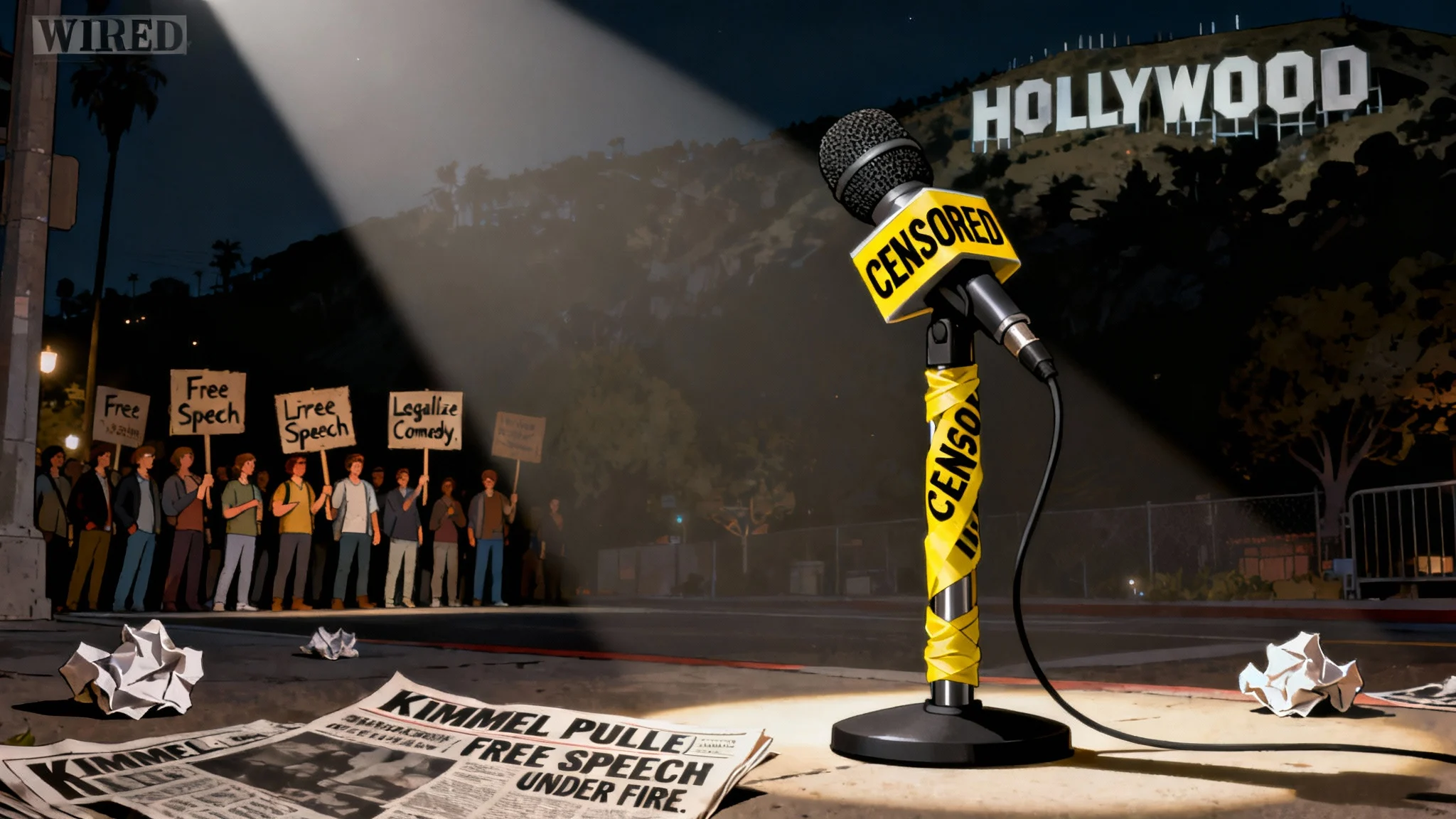
On a week when most Americans were still parsing the latest political drama, a different kind of shockwave hit the culture: ABC abruptly suspended “Jimmy Kimmel Live!” after the host’s pointed monologue about the killing of conservative activist Charlie Kirk.
The move, which followed public pressure from FCC Chair Brendan Carr and a chorus of right-wing voices, instantly became a flashpoint in the national debate over free speech, media independence, and the creeping shadow of authoritarianism in American life.
The reaction was volcanic. Hollywood, unions, and a who’s-who of comedians and public figures erupted in protest, while President Trump and his allies cheered the decision. The moment felt less like a TV controversy and more like a stress test for the First Amendment in the age of managed media.
Letterman, Kimmel, and the Anatomy of a Backlash
David Letterman, the godfather of late-night, didn’t mince words at The Atlantic Festival in New York. “This is misery,” he told the crowd, his voice carrying the weight of three decades spent skewering presidents from both parties. “We all see where this is going, correct? It’s managed media. And it’s no good, it’s silly, it’s ridiculous, and you can’t go around firing somebody because you’re fearful or trying to suck up to an authoritarian—a criminal—administration in the Oval Office. That’s just not how this works”.
Letterman’s critique wasn’t just about Kimmel. It was about the precedent: a government official threatening regulatory action, networks capitulating, and the chilling effect that ripples outward. “In the world of somebody who is an authoritarian, maybe a dictatorship, sooner or later, everyone is going to be touched,” he warned.
Comedians Close Ranks
The comedy world, often fractious and competitive, found rare unity. Wanda Sykes, scheduled to appear on Kimmel’s show the night it was pulled, posted a video: “(Trump) didn’t end the Ukraine war or solve Gaza within his first week, but he did end freedom of speech within his first year.” Marc Maron called the suspension “government censorship,” urging anyone who cares about the Constitution to speak out. Mike Birbiglia, Ben Stiller, Jean Smart, and Rosie O’Donnell all weighed in, some with humor, most with a sense of alarm.
The Writers Guild of America, SAG-AFTRA, and the American Federation of Musicians condemned the move as an attack on free speech. Outside Disney Studios in Burbank, writers and actors marched with signs reading “Defend Free Speech” and “ABC Bends the Knee to Fascism.” The protest wasn’t just about Kimmel; it was about the role of comedy as a bridge in a divided society, and the fear that bridge was being burned from both ends.
The Unexpected Voice: Karl Rove Counters MAGA
In an unexpected twist, Karl Rove—Republican strategist and architect of George W. Bush’s presidency—used the Wall Street Journal’s opinion pages to blast his own party for exploiting Charlie Kirk’s murder to wage a political purge.
Rove zeroed in on what he described as the dangerous scapegoating of an amorphous “they” for Kirk’s killing. “‘They’ didn’t pull the trigger. One person did,” he wrote, arguing that MAGA efforts to spin the tragedy into justification for censorship and retaliation were “wrong and dangerous” and would only further divide the country. “No good thing will come of it,” he warned, calling the attempt to weaponize Kirk’s death “an insult to his memory”.
That it was Rove delivering this rebuke, a figure long associated with conservative hardball politics, underscored the extraordinary nature of the moment. When even Karl Rove is pushing back against the authoritarian impulse of his party, it signals that the fight over free speech has crossed into territory too far for some Republican veterans.
The Political and Cultural Divide
The suspension split the country along familiar lines. Democratic leaders, including Barack Obama and Kamala Harris, called it a “frontal assault on free speech” and “an outright abuse of power.” Governors from New York, California, and Illinois decried the move as undemocratic and dangerous.
Meanwhile, Trump and conservative commentators celebrated. “Great News for America,” Trump posted on Truth Social, urging NBC to fire Jimmy Fallon and Seth Meyers next. Fox News’ Sean Hannity and Megyn Kelly argued that Kimmel’s comments were beyond the pale, while Barstool’s Dave Portnoy framed the suspension as “consequences for your actions.”
But now, with Rove entering the fray, the right appears split: one wing cheering censorship as “consequence culture,” the other warning that empowering government to decide which comedy can be aired is a Faustian bargain that will not stop at the political left.
Managed Media and the Future of Satire
Letterman’s list of presidents he’d mocked over the years—Carter, Reagan, Bush, Clinton, Obama—wasn’t just nostalgia. It was a reminder that late-night comedy has always been a pressure valve for American democracy. “Beating up on these people, rightly or wrongly, accurately or perhaps inaccurately, in the name of comedy—not once were we squeezed by anyone from any governmental agency, let alone the dreaded FCC,” he said.
The Kimmel suspension, coming just months after CBS axed Stephen Colbert’s “Late Show,” has many wondering if the era of sharp, independent satire is ending. Networks say “financial pressures” explain their decisions, but as Letterman and Rove both imply: what looks like economics may smell like politics.
The Stakes: More Than a TV Show
What’s at stake isn’t just one comedian’s job or one network’s programming. It’s the idea that satire, criticism, and even clumsy jokes belong in the realm of speech, not government edict. It’s the principle that comedy, at its best, is democracy’s rough draft.
With Jimmy Kimmel benched, David Letterman warning of dictatorship, and Karl Rove breaking ranks to reject MAGA’s censorship campaign, the late-night moment is no longer about ratings. It’s about whether America still believes in joking power to truth—or whether humor, too, will be managed by the state.
